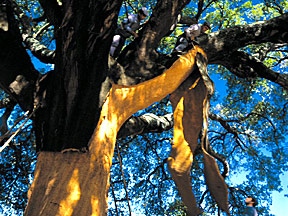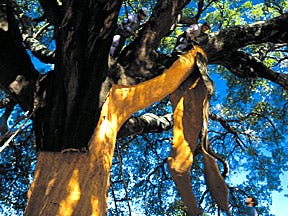Beverage packaging: Natural Cork industry aims to dispel myths about cork closures
January 30, 2014

A resource for the natural cork industry, http://www.ilovenaturalcork.co.uk, is launching a campaign to dispel what it says are a number of common misconceptions about natural cork closures and how they are manufactured
The organization issued the following press realease:
Cork tree
After hundreds of years of wine-lovers salivating over the pop of a cork, the drive towards artificial wine stoppers has undeniably had a huge impact on natural cork.
But with £11.5 billion spent each year on wine in the UK, it is time to tell the cork story, and the 28.5 million of us who enjoy a glass are being urged to get out our cork-screws once more and get behind the campaign by pledging support at http://www.ilovenaturalcork.co.uk.
Research released today highlights how little the UK really knows about natural cork and how myths surrounding its production and quality need to be debunked.
The top three most commonly held myths are:
Myth 1: Trees are cut down in the production of cork so it's better for the environment to buy other closures. More than one in five people (22%) admitted to thinking trees are cut down and 47% of the British public had no idea that trees are not harmed during the process.
Reality: Not a single tree is felled in the production of natural cork. In fact, it takes 25 years for a tree to be ready for harvest and then, and only then, the bark is harvested every nine years for around 200 years.
Myth 2: Screw caps are the most environmentally friendly closure: 25% of Brits believe this to be true.
Reality: Natural cork production has huge environmental benefits:
• It is a 100% natural, sustainable and renewable product compared with other closures – one of which is an oil based petroleum stopper and another is sourced from an open-pit bauxite mine
• According to Conservation International, the cork oak forests are a top diversity hotspot and have some of the richest and most threatened reservoirs of plant and animal life on Earth e.g. the Iberian lynx. Per one thousand square metres of cork oak forest, there are approximately 135 species of plant and many of these species have aromatic, culinary or medicinal uses
• The production of natural cork stoppers is also responsible for ten (Source 4) times less carbon dioxide emissions than plastic stoppers and 24 times less than screw caps
• It guarantees the survival of the huge 400 year old cork oak forests of the Mediterranean Basin, which are known as the 'green lung of Europe' as they absorb up to 14 million tonnes of CO2 a year. The Forest Stewardship Council has extended its sustainability accreditation to a significant proportion of the cork oak forests.
Myth 3: Corked wine is still an issue of wine using natural cork stoppers: 1 in 5 wine drinkers (25%) still worry about wine which uses natural cork because it might be corked.
Reality: The cork industry has invested millions in tackling naturally occurring taint. At this year's 'world championship of wine' – the Concours Mondial de Bruxelles – of almost 7,000 bottles opened at the prestigious event approximately only 1% were identified as being affected by TCA (or 2,4,6-trichloroanisole), also known in the trade as cork taint. This is well within standards and also, importantly, in line with other recorded faults with wines sealed with screw caps and plastic stoppers.
According to the World Wildlife Fund (WWF), if natural cork's share of the wine closure market continues to decline at the same rate, then three quarters of the Western Mediterranean's cork oak forests could be lost within the next ten to fifteen years (source 6).
Don't just take our word for it:
The RSPB's Jose Tavares works with SPEA, the RSPB's Portuguese partner. He said: "For centuries, the production of cork has helped to retain cork forests, one of the richest wildlife habitats in southern Europe. A range of species from eagles and Iberian lynx to songbirds and reptiles find a vital refuge in these forests, and a reduction in the use of natural cork threatens the existence of these special species and also a magical and vibrant landscape.
Jilly Goolden, wine critic, says: ""For me there isn't a completely satisfactory alternative to real cork as a wine bottle closure. Cork is entirely natural and environmentally sound, to say nothing of the romance, history and theatre of the cork."
Julia Bradbury, Countryfile presenter and supporter of environmental and rural issues, says "Natural cork has an incredible story which most people aren't aware of – it is so much more than just a stopper for a wine bottle. The cork oak forests of the Mediterranean are a true bio-gem of the world. They support a sustainable valuable industry which employs and engages up to 100,000 people. By making a small decision to choose wine which is sealed with natural cork rather than an artificial stopper, you can do something tangible to protect nature and the environment."
So, now is the time for wine drinkers to do one small thing to make a huge environmental difference. Visit http://ilovenaturalcork.co.uk and pledge your support for natural cork. Join the conversation about natural cork on our Facebook page too.
SOURCE: ilovenaturalcork.co.uk
.
About the Author(s)
You May Also Like



